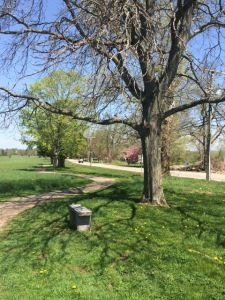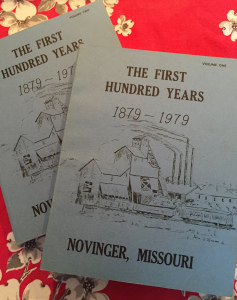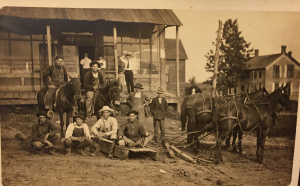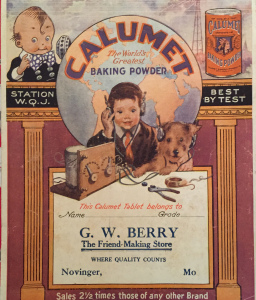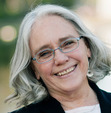Edith Maxwell's Blog, page 249
October 1, 2015
From Somewhere Further Down The Road — Guest Art Taylor
First and foremost, I want to thank Sherry Harris for inviting me to blog here at Wicked Cozy Authors—and by “foremost,” I mean that the various elements of this sentence are ultimately the only things I’m going to write about here.

“Art Taylor”
Sherry and I now live in the same small Northern Virginia town. It’s a suburb of Washington, DC, so part of a larger cosmopolitan community, but it’s an area that also has a small town feel. Sherry and I have run into each other at the grocery store parking lot, for example (I think that’s where she first asked me about the guest post here), and we’ve talked about trying to gather friends together more often for coffee or for trips to the park to ride the miniature train that my son so dearly loves. It’s a nice place to live in so many ways, and much of it has a hominess about it, and yet… and yet I couldn’t help but notice that the bio on Sherry’s own website notes that she and her husband “are living in northern Virginia until they figure out where they want to move to next,” and I know how often my wife Tara and I have mused about where we might like to live someday as well, as if our real homes are ultimately one of two places: where we once grew up or, specifically in our case, where we’d like our son to grow up. Maybe here, but (who knows?) maybe not.
I started thinking about these notions of where we’re from and where we are and where we’re going because of the subheading on the Wicked Cozy Authors page: “Mysteries with a New England Accent”—a tagline that has me doubly appreciating Sherry’s invitation for me to guest post here (and appreciating again Edith Maxwell and Barbara Ross hosting the Agatha finalists earlier this year) because, as anyone who’s ever heard me speak knows, I do not have a New England accent—and, important to my point here, neither does my fiction.
All of us who identify as mystery writers must surely find our works informed by the various traditions and rules of crime fiction; that term provides a large umbrella for various styles and approaches, of course, but suffice it to say that a person writing a traditional mystery must surely remain aware of the rules of a fair play mystery, of the weight of all the works in our genre that have preceded us. In a similar vein, it’s likely true that we may be defined by place—not only in terms of the settings we’ve chosen for our stories and novels but also by the places we’re from, the places we’ve lived, and maybe even (more on this in a minute) by previous literary works about those places.
Sherry’s Garage Sale Mysteries, for example, expressly draw on her years in Massachusetts as much as on her love of garage sales, and reading her work, I’m struck by how often place finds itself not just a character of sorts but also a guiding force in her writing. Early in Tagged for Death, at the first mention of the term “garage sale,” Sherry stops to add a parenthetical clarification: “tag sale, for those in the Northeast.” And it’s not long before we’ve also gotten a quick discussion of “Roast Beef and Pizza places… a New England thing,” and a short lesson clarifying that the Sleepy Hollow of Washington Irving’s Ichabod Crane isn’t related to the Sleepy Hollow Cemetery of Concord, Massachusetts, whose Authors Ridge has held the graves of Alcott, Hawthorne, Emerson and Thoreau (a spot which also plays a role in the closing pages of the book).
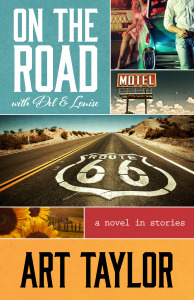 My own work is more likely to be grounded somehow in my native state of North Carolina. (My wife too is a writer, from Pennsylvania originally, and those PA roots often run deep in her own fiction.) The adventures in my recent book On the Road with Del & Louise: A Novel in Stories take those title characters—a small-time crook and his lover—across the country: Del’s supposed “last” heist takes place in Taos, New Mexico, before he begins a legit job with his sister in Victorville, California, and from there this unpredictable pair travel to Napa Valley, to Las Vegas, and to Williston, North Dakota. But along the way, it’s Louise’s voice, grounded in her own North Carolina upbringing, that drives the story, and its those various memories of the past—of her mother, of North Carolina’s sweet muscadine wines, of sucking the nectar from honeysuckles, of small town Southern life—that punctuate the tales and that gradually draw them back to Louise’s home state for the final story.
My own work is more likely to be grounded somehow in my native state of North Carolina. (My wife too is a writer, from Pennsylvania originally, and those PA roots often run deep in her own fiction.) The adventures in my recent book On the Road with Del & Louise: A Novel in Stories take those title characters—a small-time crook and his lover—across the country: Del’s supposed “last” heist takes place in Taos, New Mexico, before he begins a legit job with his sister in Victorville, California, and from there this unpredictable pair travel to Napa Valley, to Las Vegas, and to Williston, North Dakota. But along the way, it’s Louise’s voice, grounded in her own North Carolina upbringing, that drives the story, and its those various memories of the past—of her mother, of North Carolina’s sweet muscadine wines, of sucking the nectar from honeysuckles, of small town Southern life—that punctuate the tales and that gradually draw them back to Louise’s home state for the final story.
These observations—how Sherry’s novels and my stories and my wife’s stories too are all informed by place—might simply prove how some details of a story are byproducts of the more central roles that character and setting play in any work of fiction. But I’m curious beyond that.
The Southern literary tradition is a real one—it’s been endlessly studied, even if there are disagreements still about exactly how narrowly to define it—and I’m certain that other regions of the country might be able to trace themes and elements that have dominated and defined the literature of their areas, the mappable landscapes of their literature. But when we writers put pen to paper, how conscious are we of those geographical literary traditions? To circle back to the subheading on the Wicked Cozy Authors page, what does it mean for a mystery to have a “New England Accent” or a Southern accent or whatever? (New York patter? Chicago twang? California surfer speak? …by which I’m not just talking about dialogue, of course.)
To answer that question, I’ve…
Whoops! Sherry just pointed out that I’ve hit my word count here! Oh, well.
Anyone else want to chime in with their own thoughts on this in the comments section? I’d love to chat more, clearly—whatever accent you’re bringing to the conversation.
A native of Richlands, NC, Art Taylor is the author of On the Road with Del & Louise: A Novel in Stories, recently published by Henery Press, and the editor of Murder Under the Oaks, the 2015 Bouchercon Anthology. His short fiction has won two Agatha Awards, a Macavity Award, and three consecutive Derringer Awards. His story “The Odds Are Against Us” is currently a finalist for this year’s Anthony and Macavity Awards. Art teaches at George Mason University and writes frequently on crime fiction for both the Washington Post and Mystery Scene. www.arttaylorwriter.com.
Readers: What is the answer to Art’s question — “When we writers put pen to paper, how conscious are we of those geographical literary traditions?” Writers, how much do you put into this? Readers, are you drawn to books set in a particular region? Which region?
Filed under: Guest posts Tagged: Art Taylor, Las Vegas, Napa Valley, New England, New England Accent, North Carolina, Northern Virginia, On The Road With Del and Louise, Taos New Mexico, Victorville California, Washington DC, Williston North Dakota

September 30, 2015
Wicked Wednesday: Memories of an Elder
Wicked Wednesday once again, where we all contribute to the same topic. This has been a wicked kind of month – five Wednesdays! Continuing on our theme of memories, Wickeds, who is an elder you remember strongly? A grandparent, great-aunt, neighbor, teacher – tell us who she or he was and why you remember that person so well. Bonus points if the relationship had an effect on your career as an author.
Liz: My grandpa, hands down. He was a detective who loved to tell stories about his 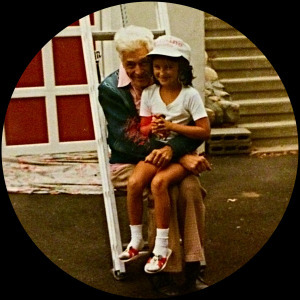 adventures, so I guess you can see the correlation with my career! He loved to tell this one story about a guy named Nick Maluff, who had this dog who allegedly bit everyone he met. It was like that game of telephone. Every time he told the story the dog was more vicious and had attacked more people, until you would’ve thought he was out terrorizing the city on a daily basis. Turns out, the dog was just a sweet little pup who had maybe nipped at one person. Most likely my Gramp, who probably poked him with his cane or something! I always wished I’d gotten to hear more stories from his police adventures before he died.
adventures, so I guess you can see the correlation with my career! He loved to tell this one story about a guy named Nick Maluff, who had this dog who allegedly bit everyone he met. It was like that game of telephone. Every time he told the story the dog was more vicious and had attacked more people, until you would’ve thought he was out terrorizing the city on a daily basis. Turns out, the dog was just a sweet little pup who had maybe nipped at one person. Most likely my Gramp, who probably poked him with his cane or something! I always wished I’d gotten to hear more stories from his police adventures before he died.
 Barb: This is my great-grandfather, Walter P. Taylor, Sr. He lived until I was in seventh grade, so I knew him quite well. He lived with my dad’s family during the thirties, forties and fifties, so my dad grew up with him in the house and they were particularly close. But by the time I remember him, he lived in Myrtle Beach with my great aunt and uncle. Every year, on the last day of school in June, my grandmother would pick up my brother and me and take us, along with my great-grandfather (whom we called ManPop for reasons to complicated to explain here), out to her summer house in Water Mill, Long Island. We spent two weeks, a lovely time, of beaching, going out to lunch, and to the penny candy store. In this photo, he is doing the thing I remember best, painting beautiful tiles. With his help, my brother and I painted them, too and then we took them to be glazed. I still have many of his tiles at my house, as well as some with my brother’s and my own childish drawings.
Barb: This is my great-grandfather, Walter P. Taylor, Sr. He lived until I was in seventh grade, so I knew him quite well. He lived with my dad’s family during the thirties, forties and fifties, so my dad grew up with him in the house and they were particularly close. But by the time I remember him, he lived in Myrtle Beach with my great aunt and uncle. Every year, on the last day of school in June, my grandmother would pick up my brother and me and take us, along with my great-grandfather (whom we called ManPop for reasons to complicated to explain here), out to her summer house in Water Mill, Long Island. We spent two weeks, a lovely time, of beaching, going out to lunch, and to the penny candy store. In this photo, he is doing the thing I remember best, painting beautiful tiles. With his help, my brother and I painted them, too and then we took them to be glazed. I still have many of his tiles at my house, as well as some with my brother’s and my own childish drawings.
Edith: I was always particularly fond of my San Francisco aunt Jo Reinhardt, and was close to 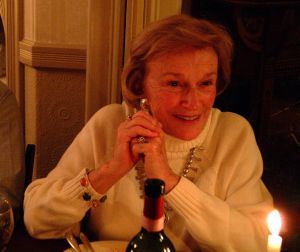 her. She was my father’s baby sister, and ended up the tallest of the three siblings. I know she was grateful and surprised to live into her eighties, since both her parents, as well as her sister and brother, died in their sixties. Jo was a fabulous cook, a generous smart sweet woman, both elegant and practical, a mother of three boys (when I became mother of two sons, we had an extra link), and a memoirist in her later years. She loved having fun – our families had a reunion when she was in her seventies and she was dancing as much as any of us in the living room one night. She and my uncle Dick were very close and always seemed to model the perfect relationship to me. Her laugh was a rill of bells and her eyes always seemed to be smiling. Miss you, Jo!
her. She was my father’s baby sister, and ended up the tallest of the three siblings. I know she was grateful and surprised to live into her eighties, since both her parents, as well as her sister and brother, died in their sixties. Jo was a fabulous cook, a generous smart sweet woman, both elegant and practical, a mother of three boys (when I became mother of two sons, we had an extra link), and a memoirist in her later years. She loved having fun – our families had a reunion when she was in her seventies and she was dancing as much as any of us in the living room one night. She and my uncle Dick were very close and always seemed to model the perfect relationship to me. Her laugh was a rill of bells and her eyes always seemed to be smiling. Miss you, Jo!
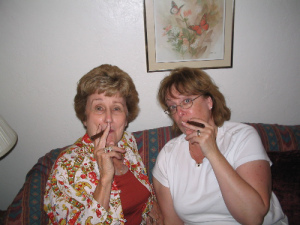 Sherry: My Aunt Pat isn’t a blood relative but my mom’s sorority sister. She was beautiful, interesting, funny, and oh, so full of life. She married her college sweetheart — Uncle John — on radio show and won a honeymoon in Carmel, California! They lived in Arizona, very far from me in Iowa so each visit was extra special. Everyone should have an Aunt Pat in their lives. Aunt Pat always told the story of one of their visits when I was in high school. I was supposed to clear the table and do the dishes but told my mom that I needed to talk to Aunt Pat. The picture of us is the last time I saw her — she died unexpectedly six months later. But it’s a perfect example of how fun it was to be around her — the cigars are cookies.
Sherry: My Aunt Pat isn’t a blood relative but my mom’s sorority sister. She was beautiful, interesting, funny, and oh, so full of life. She married her college sweetheart — Uncle John — on radio show and won a honeymoon in Carmel, California! They lived in Arizona, very far from me in Iowa so each visit was extra special. Everyone should have an Aunt Pat in their lives. Aunt Pat always told the story of one of their visits when I was in high school. I was supposed to clear the table and do the dishes but told my mom that I needed to talk to Aunt Pat. The picture of us is the last time I saw her — she died unexpectedly six months later. But it’s a perfect example of how fun it was to be around her — the cigars are cookies.
Julie: My maternal grandparents were/are very special to me. Though I loved my grandfather fiercely, and still miss him. 35 years after his death, I think my grandmother had the most influence on me. She used to say that grandchildren were the applause of life, and she treated us accordingly. That said, she was very human to me, foibles and all, and I loved her very, very much. She taught me how to knit, the secret to a great apple pie, to love shows like Dallas and Dynasty, and that love could be complicated. Today, as I put on the red lipstick and put a couple of bobby pins in my hair to keep it from fluffing up beyond belief, I think of her, and smile.
Readers: Which older person do you miss the most, or learned the most from?
Filed under: Wicked Wednesday Tagged: Aunt Pat, Carmel, grandpa, great-grandfather, Phoenix

September 29, 2015
The Lure of Small Towns — Guest Mollie Cox Bryan
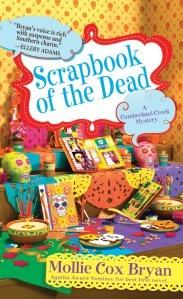 Please join us in welcoming Mollie Cox Bryan. It is so exciting to have Mollie with us here today because we get to celebrate the release of Scrapbook of the Dead the fifth book in her Cumberland Creek Mystery series. So happy book birthday, Mollie!
Please join us in welcoming Mollie Cox Bryan. It is so exciting to have Mollie with us here today because we get to celebrate the release of Scrapbook of the Dead the fifth book in her Cumberland Creek Mystery series. So happy book birthday, Mollie!
“Three or four families in a country village is the very thing to work on,” is a Jane Austen quote that many writers take inspiration form, including myself. But I like the second part of that quote, as well. “And I hope you will do a great deal more, and make full use of the while they are favourably arranged.” And if a mysterious element is added, like a murder or a theft, the plot gets even more “favourably arranged.” (Okay, I added that last little bit.)
Small towns are enticing for writers for many reasons. Plot-wise, they can act as a microcosm of society, for example. If you are so inclined. But for me, I’ve always found my attraction to small towns to be fed by my observation of small towns and my admittedly somewhat odd imagination. Picket fences and cobblestones streets, along with beautiful historical buildings, are often the façade for something deep and dark in my mind. If it looks too perfect, it raises suspicions to me. Maybe it’s just me, but I want to know: What’s going on behind those pretty closed doors?
 My curiosity is often ignited by what I see around me in my own small town. The sometimes twisted curiosity of my own neighbors when it comes to personal matters like religion, politics, and who knows what else. When I first moved to my small town after living in the Washington, DC area for many years, I was asked at least five times what church I attend. Um. None of your business. (Nobody in DC ever asked me this question. Funny, that.)
My curiosity is often ignited by what I see around me in my own small town. The sometimes twisted curiosity of my own neighbors when it comes to personal matters like religion, politics, and who knows what else. When I first moved to my small town after living in the Washington, DC area for many years, I was asked at least five times what church I attend. Um. None of your business. (Nobody in DC ever asked me this question. Funny, that.)
Another time, an elderly neighbor of mine nearly accosted me at my front door about the last presidential election. Imagine. I had just wanted to take out the trash, opened my door, and the tirade against a certain politician began.
Beyond my personal experiences living in a small town, are the national statistics about small towns. Many are fighting serious drug problems, dealing with new immigrant populations, and failing local economies. After 16 years of living in a small town, many the locals still consider me an outsider. Imagine if I were from the Philippines, Mexico, or even England. How much of an outsider would I be then? In SCRAPBOOK OF THE DEAD, my characters confront their own ignorance as they get to know local immigrants. Attitudes shift and change.
Almost all cozy mysteries are set in small towns. It seems to be one of the “rules” of cozy mysteries, along with using amateur sleuths in our stories and not using graphic sex or violence. I love to play with the ideas readers might have about small towns and give them a twist or two to think about.
The big cities have a different kind of appeal—but we are not often surprised to learn of a murder in a huge city, the way we are with small towns. We think we are safer in small towns, but are we? The answer is not really. A recent report, the Annals of Emergency Medicine, claimed cities are actually safer to live in than small towns. Now, it is true that you are more likely to be murdered in cities. But “The risk of injury death — which counts both violent crime and accidents — is more than 20% higher in the countryside than it is in large urban areas.”
Much to ponder here, heh?
In any case, cozy mystery writers work with that “surprised it happened in such a lovely community” factor and are adept at exploring it in their writing, along with the characters and the stories about their small town lives, hobbies, families, and jobs. We don’t give you the graphic details of the murder—that is not what we are interested in. I don’t speak for all cozy mystery writers, of course, but I think what we are interested in is the three or four families in that country village: what becomes of them when one of their own is killed? Or turns out to be a murderer?
Mollie Cox Bryan writes the Cumberland Creek Scrapbooking Mysteries. Scrapbook of Secrets, the first in the series, was nominated for an Agatha Award for Best First Novel of 2012 and was selected by B & N as a mystery to watch. The latest book in the series is Scrapbook of the Dead. She is launching a new series next year, a craft retreat series, Cora Crafts Mysteries. She lives in Waynesboro, Va. with her husband and two daughters. Visit her website: http://www.molliecoxbryan.com
Readers: Which do you prefer small town or city?
Filed under: Guest posts Tagged: crimes in small towns, Cumberland Creek Mysteries, Jane Austen, Jane Austen quotes, Mollie Cox Bryan, Scrapbook of the Dead, small towns

September 28, 2015
Life on the Town Green
By Liz, coming to grips with the end of summer and looking forward to the first pumpkin spice latte of the season….

Shaggy enjoying a rest during our walk.
I’m neck-deep in revisions right now, as well as halfway through the first draft of another book, but with the start of the cooler weather I vowed to get back into one of my favorite habits: Walking the town green with the dogs.
Some of you might know the green was where the idea for Stan’s small town, Frog Ledge, in the Pawsitively Organic Mysteries, originated. It seemed like the perfect place around which to build a town. This town green is actually very interesting. It’s about a mile long, a portion is still being used for agriculture, and a number of historic buildings are positioned around it. The dogs like the gravel path that runs the perimeter.
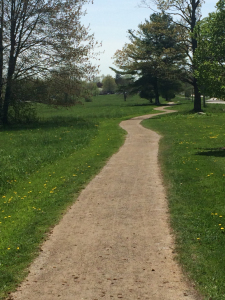 In the books, Stan lives right on the green, which I always thought would be fun. You get front row seats for all the cool events, from Farmers’ Markets to National Dance Like a Chicken Day (I’m not kidding!).
In the books, Stan lives right on the green, which I always thought would be fun. You get front row seats for all the cool events, from Farmers’ Markets to National Dance Like a Chicken Day (I’m not kidding!). 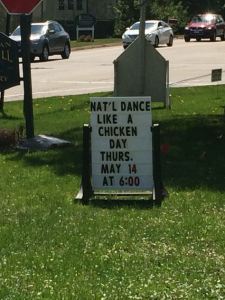
People walk, run and take their dogs and kids with them along the path. Shaggy loves meeting all the other dogs along the way. (The boys bark out of jealousy at Shaggy making new friends.)
It’s also a place where you can sit on a bench and read, or meditate, or simply sit and watch the town go by.
It’s quintessential New England – the church looks like it belongs on a postcard, right?
By the time the dogs get around the entire mile, they usually want to rest and enjoy the scenery.
We’re looking forward to an autumn full of walks, colorful trees and scenery, and lots of pictures to share with readers who want to have a good picture of Frog Ledge. We’re grateful to have the green in our neighborhood! 
Readers, what’s your favorite place?
Filed under: Liz's posts Tagged: Frog Ledge, Pawsitively Organic Mysteries, town green

September 25, 2015
Opening Lines
Write an opening line for a story that includes this delightfully creepy image–contributed by author Kate Flora.

Jessie: Clara glared into the pond. When she had thrown Harvey’s weighted-down body in a week earlier she felt sure she’d never have to think of her brother’s favorite phrase ever again. But Harvey had had the last laugh. You really couldn’t keep a good man down.
Julie: “You’ll have to pry it out of my cold, dead hand,” she said. She lied. Even then she wouldn’t let go. Story of our life, and reason for her death.
Edith: Marge, having just graduated from what she privately called Detective School, thought, So that’s what a drowning victim’s hand looks like. But why is it still clinging to the rope? And where did its fingertips go?
Sherry: No one loved a good Halloween prank better than Bert but Midge guessed he wasn’t laughing now.
Barb: “It’s just an old glove,” Carol thought, rowing closer. “Protection for a fisherman’s hands is all.” Then she dipped the oar into the water to free it and…
How about you, readers? Give us your opening lines.
Filed under: Opening Lines Tagged: drowning, kate flora, opening lines

September 24, 2015
On Appreciating
Edith here, north of Boston, trying to ride the cusp between summer and fall.
Appreciation, gratitude, thanks – I think I sometimes use these terms a bit too lightly. The etymology of “appreciate” is setting a price, but has come to mean understanding the value of a thing, person, or action.
I am grateful for much in my life: my health, my family, my ability to craft stories, and my good fortune in having people out there who like to read those stories. I try to thank people when it’s appropriate, when I feel it, when I know it’s needed. But appreciation? Let me give you couple of examples. They both relate to thoughts I’ve had about memorial services. It’s important for many reasons to celebrate a person’s life after they have slipped the mortal coil. But what about celebrating them while they’re still here to hear it? Of course none of us has any idea when we’re going to encounter the TIME’S UP sign. (My dad died suddenly when he was 63, and I was so glad we were on good terms and I had
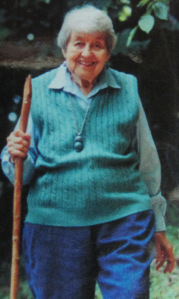
Lynn “Mooncat” Buck’s author picture, taken at Pyramid Lake, from the back cover of her second novel, AMANDA’S HOUSE (2002).
let him know of my love and appreciation frequently.)
Many years ago I attended a fabulous Women’s Writing Retreat (still ongoing every July) in the Adirondacks. One of our elders, an author and feminist in her late seventies who went by the camp name of Mooncat, read a poem one night that she’d written for her third husband. She prefaced it with, “I just wish I’d written it while he was still alive.” So, several of us wrote a beat poem for her one afternoon and performed it at the closing campfire. She loved it! She died several years later, and I was grateful we had honored her while we could.
Richard Gale is a long-time attender of Amesbury Friends Meeting (Quaker). He has almost singlehandedly managed and improved our historic Meetinghouse for fifteen years. He’s now 85, and after a tough year, healthwise, he recently stepped down 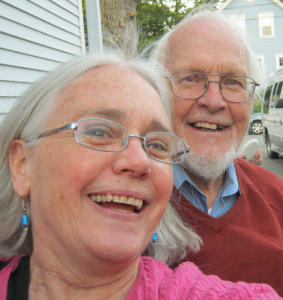 as Clerk of the Building Committee. I love this guy dearly, and nobody knows how long he’s going to be around.
as Clerk of the Building Committee. I love this guy dearly, and nobody knows how long he’s going to be around.
I’m Clerk of the Meeting these days (for Quakers, that means being in charge, sort of), in addition to all the other stuff I do. So I took Clerk’s prerogative and wrote a Minute of Appreciation last week. I read it at our business meeting Sunday, and Friends gladly accepted it, then I read it again at the end of worship. Since Richard also LOVES pies and his dear wife Annie does 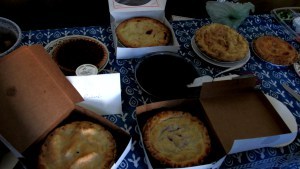 not bake, I also organized Pies of Appreciation and baked one myself.
not bake, I also organized Pies of Appreciation and baked one myself.
Richard was touched and delighted. We all sampled some of the seven pies, but he still had four full pans to take home. And we had the satisfaction of honoring him.
Readers: Who have you let know you appreciate them lately? Anybody you missed the chance with and wish you’d acted more promptly?
Filed under: Edith's posts Tagged: Amesbury Friends Meeting, Appreciation, Lynn Buck, Pyramid Lake Women's Writing Retreat

September 23, 2015
Wicked Wednesday: Memories of Our Mothers
Edith here, and it’s Wicked Wednesday again. Since today would have been my 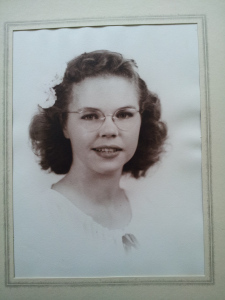 mother’s 90th birthday if she hadn’t passed away three years ago, let’s talk about our moms. Two of us here no longer have a mother living, and the rest still do. What’s your favorite memory of Mommy Dearest? What about the time she meted out a punishment you knew you deserved? Dish, Wickeds – and it doesn’t have to be all cream and roses!
mother’s 90th birthday if she hadn’t passed away three years ago, let’s talk about our moms. Two of us here no longer have a mother living, and the rest still do. What’s your favorite memory of Mommy Dearest? What about the time she meted out a punishment you knew you deserved? Dish, Wickeds – and it doesn’t have to be all cream and roses!
Edith: Okay, I’ll start. I had a rowdy year in ninth grade. I was flip, stayed out too long after school, lied about some stuff. My mother, who had never before uttered a single swear word in my presence and never hit us (neither of my parents did either of those things), said “Damnation” a couple of times that year and twice she slapped me. I was so shocked. I clearly had pushed her past her limits (and I totally deserved it). But she also taught me to sew and to bake, how to go camping, how to identify the constellations, and how to be a fabulous grandma. I just wish she’d gotten to read some of my books, since she also taught me by example to read mysteries. Happy birthday, Mommy!
Liz: When I was little, my mother stayed home with me. My favorite time of day was early in the morning, before my father got up. She would read to me until it was time to make breakfast. I remember wishing those hours could go on all day. She also taught me to bake apple pie. To this day, I love the smell of homemade apple pie!
Jessie: Mothers give and give in little ways that don’t always get the acknowledgement they deserve. One thing that really stands out for me in my life is the fact that my mother went through a great deal of effort and heart-break to provide me with my sisters. I am eternally grateful for them and for her efforts which made them a part of my life.
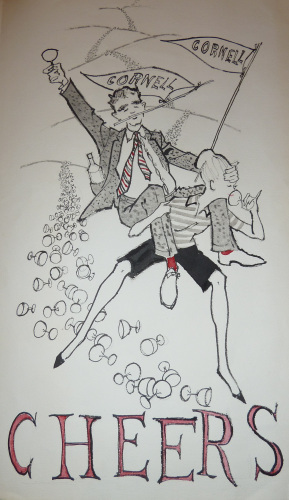 Barb: I’ve put up this drawing because I thought it was a little different. It’s the front of a poster-sized card Carter Scattergood, an artist friend of my parents, made for them for a good-bye party they threw when we moved from Montclair, New Jersey to Wallingford, PA. In truth, it captures my father, whose face was more easily caricatured, better than my mother. (And yes, those are martini glasses trailing behind them.What can I say? It was the sixties.) The memory this evokes for me is how my mother found ways to make the days when there was lots of boring housework to be done fun for my brother and me. When she defrosted the refrigerator, she gave us food coloring to add to the ice in the sink. Or on days of big parties, like this one, she would move the dining room table and roll up the rug. Then she would pour some kind of liquid wax on the floor and tie rags to our feet. We would skate around the floor, buffing it. The big game was to jump up and touch the brass chandelier, now hanging low enough over the empty space where the table had been that we could reach it. After scuffing along the wood floor, you could give yourself the most tremendous shock, which would reduce us to near hysterical giggles.
Barb: I’ve put up this drawing because I thought it was a little different. It’s the front of a poster-sized card Carter Scattergood, an artist friend of my parents, made for them for a good-bye party they threw when we moved from Montclair, New Jersey to Wallingford, PA. In truth, it captures my father, whose face was more easily caricatured, better than my mother. (And yes, those are martini glasses trailing behind them.What can I say? It was the sixties.) The memory this evokes for me is how my mother found ways to make the days when there was lots of boring housework to be done fun for my brother and me. When she defrosted the refrigerator, she gave us food coloring to add to the ice in the sink. Or on days of big parties, like this one, she would move the dining room table and roll up the rug. Then she would pour some kind of liquid wax on the floor and tie rags to our feet. We would skate around the floor, buffing it. The big game was to jump up and touch the brass chandelier, now hanging low enough over the empty space where the table had been that we could reach it. After scuffing along the wood floor, you could give yourself the most tremendous shock, which would reduce us to near hysterical giggles.
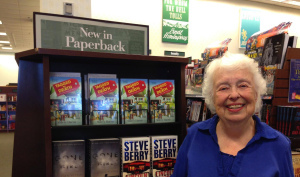 Sherry: Hi, mom! My mom reads our blog every day and often buys the books she finds out about here! I have two stories. The first is from when I was in second or third grade. My sister and I shared a room. One night I crawled in bed with my sister and we were talking and giggling way past a time we should be — so much so that we woke our mom up. Mom came in our room and was shaking her finger first at one bed and then the other. We were hysterical with suppressed laughter as she gave us a good talking to not realizing we were both in one bed. In her defense it was pitch black and she didn’t have her glasses on. As soon as she left, I scrambled back to my bed still shaking with laughter. The second story is from high school. The book Valley of the Dolls had just come out and my mom asked me not to read it. So, of course, I rushed right out and bought it. Mom happened on it one day putting something in my dresser. She looked at it, then looked at me. I thought my life was probably over. But she said, “I didn’t mean to pry,” and walked out of the room. As you can see from the photo above, she’s my biggest fan!
Sherry: Hi, mom! My mom reads our blog every day and often buys the books she finds out about here! I have two stories. The first is from when I was in second or third grade. My sister and I shared a room. One night I crawled in bed with my sister and we were talking and giggling way past a time we should be — so much so that we woke our mom up. Mom came in our room and was shaking her finger first at one bed and then the other. We were hysterical with suppressed laughter as she gave us a good talking to not realizing we were both in one bed. In her defense it was pitch black and she didn’t have her glasses on. As soon as she left, I scrambled back to my bed still shaking with laughter. The second story is from high school. The book Valley of the Dolls had just come out and my mom asked me not to read it. So, of course, I rushed right out and bought it. Mom happened on it one day putting something in my dresser. She looked at it, then looked at me. I thought my life was probably over. But she said, “I didn’t mean to pry,” and walked out of the room. As you can see from the photo above, she’s my biggest fan!
Julie: My mother is wonderful. She and my dad are a great team, and have been a huge blessing in my life. I have lots of great memories of her, but I was just telling the nieces a story that sticks in my mind. One year she got talked into being a Girl Scout leader by her friend Diane. We went winter camping, which involved a lodge, and outhouses. She forgot her boots, so she had to wear trash bags on her feet. At one point someone dropped a flashlight down the outhouse hole (it was a multi seat outhouse. I sill shudder at the memory) and she said “if there’s a girl attached to that flashlight, she’s outta luck.” On our way home, she turned to my sister and I and said “Don’t even think about getting near that bathtub until I’m done. And I’m not going to be done for a long, long time.” Needless to say, she didn’t camp again.
Readers: Memories of your mom? Or a mom who was important to you?
Filed under: Wicked Wednesday Tagged: Mom, sisters

September 22, 2015
Welcome Back, D.E. Ireland!
by Barb who’s recovering from knee replacement surgery
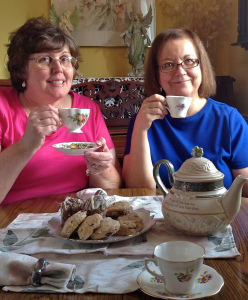 The last time D.E. Ireland (actually the writing team of Meg Mims and Sharon Pisacreta) visited, it was to celebrate the launch of their first Eliza Doolittle and Henry Higgins Mystery–
Wouldn’t It Be Deadly
. That time we talked about their process of writing as a team, which blew most of us solo-writing Wickeds away. Now they’re back to celebrate the release of the second book in the series,
Move Your Blooming Corpse
, which happens to launch today! Welcome, D. E. (and Meg and Sharon).
The last time D.E. Ireland (actually the writing team of Meg Mims and Sharon Pisacreta) visited, it was to celebrate the launch of their first Eliza Doolittle and Henry Higgins Mystery–
Wouldn’t It Be Deadly
. That time we talked about their process of writing as a team, which blew most of us solo-writing Wickeds away. Now they’re back to celebrate the release of the second book in the series,
Move Your Blooming Corpse
, which happens to launch today! Welcome, D. E. (and Meg and Sharon).
Barb: We’re so honored to have you here on release day for Move Your Blooming Corpse! Do either of you have any release day rituals? I don’t mean responding to blog comments or obsessively checking Amazon rankings. I mean something you do to savor the accomplishment and enjoy the day.
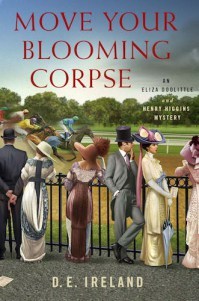 Sharon: When I was writing for another house, I always framed my cover flats and treated myself to a crystal figurine representing my latest book. (For example, a small crystal cobra for a historical set in Egypt.) But Meg and I have been so busy writing both the DE Ireland series and our individual series that we’ve left little time to celebrate. I’m beginning to think we should buy ourselves a nice piece of jewelry on our release day. For now, dinner at a favorite restaurant is how I choose to mark the great day.
Sharon: When I was writing for another house, I always framed my cover flats and treated myself to a crystal figurine representing my latest book. (For example, a small crystal cobra for a historical set in Egypt.) But Meg and I have been so busy writing both the DE Ireland series and our individual series that we’ve left little time to celebrate. I’m beginning to think we should buy ourselves a nice piece of jewelry on our release day. For now, dinner at a favorite restaurant is how I choose to mark the great day.
Meg: Dinner is nice, but I prefer visiting my favorite tea room to celebrate. Sharon used to live closer to that spot, but now she’s moved across the state. Last year, we did a “tea and book” event at Sweet Afton in Plymouth, with twenty some friends. And I also bought a lovely purple Kate Spade purse, and added a few British charms to my Pandora bracelet. This year, I’m still debating what to do or buy.
Barb: Hmm…I keep looking at my cover flats and thinking I should do something with them. Move Your Blooming Corpse takes place in the world of Edwardian horse racing. We know you love the era, but were either of you “horse” people before? Why did you decide on horse racing, and how did you research it?
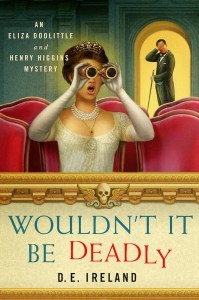 Meg: My daughter is a natural horsewoman. Horses love her, she loves them. On the other hand, I prefer watching horses. When it comes to riding – no thanks. But the history of British horse racing and the suffragette who was trampled to death by the King’s horse in 1913 fascinated me. It seemed natural to dig deeper and incorporate the “real life” events and people into our fictional world.
Meg: My daughter is a natural horsewoman. Horses love her, she loves them. On the other hand, I prefer watching horses. When it comes to riding – no thanks. But the history of British horse racing and the suffragette who was trampled to death by the King’s horse in 1913 fascinated me. It seemed natural to dig deeper and incorporate the “real life” events and people into our fictional world.
Sharon: I love horses from afar. But whenever I’ve found myself riding one of them, I grow nervous. They’re just so big! My fear didn’t stop my best friend and me from creating a horseback riding club when we were in middle school, which was less about our love of riding than a way to get out of class. We chose horse racing as the main topic for Book Two because the scene in My Fair Lady when Eliza appears at Royal Ascot in that glorious white and black outfit was just so memorable. We had to find a way to expand upon it. And the more we researched the Edwardian racing world, the more we realized what a fascinating and colorful subject it was. Most of the suspects and victims in Move Your Blooming Corpse are based on real individuals from that time period.
Barb: What is the strangest thing you found out about horse racing in the Edwardian era during your research?
Sharon: Even the richest society women were discouraged from owning a racehorse. I found this strange since riding was such an important leisure activity for ladies of the Edwardian era. Luckily, some intrepid females were able to get around this prejudice. We based one of our characters on the Duchess of Montrose, who owned racehorses under the false name ‘Mr. Manton’. She married three times, but supposedly the only man allowed to enter her private bedroom was her horse trainer. And I quite enjoy the fact that she married her third husband when she was 70…and he was 24.
Meg: What I found strange was that fashion was as important as the race, just like now! Wealthy women wore a different outfit and hat each day, and tried to one-up each other. Take for example the “Black Ascot” of 1910, since King Edward VII died just before the racing event – but it wasn’t canceled since he was such a racing enthusiast. A facsimile of the costumes (black, white and gray) appear in the film My Fair Lady. Huge hats and feathers galore (dyed), gloves, parasols, elaborate gowns over the S-bend corset, which couldn’t have been all that comfortable for an all-day event.
Barb: What are you working on now, both as a team and individually?
Meg: As the D.E. Ireland writing team, we finished Book Three of the Eliza Doolittle and Henry Higgins series and have brainstormed ideas for Books Four and Five. At the request of our agent, we are also putting together another mystery series proposal to collaborate on.
Sharon: Earlier this year I sold a cozy mystery series to Kensington that I’m writing under the name ‘Sharon Farrow’. The Berry Basket series is set in a beautiful resort town along the shores of Lake Michigan, very much like the village I currently live in. The first book in the series, Dying For Strawberries, will be released November 2016, with subsequent books to follow every nine months.
Meg: Sharon and I will be working on another collaboration once we get a proposal written. My agent has several proposals out for me with editors, one historical and one cozy. I’m working on a short story for a western romance anthology, A Mail Order Christmas Bride, plus a contemporary romance pet rescue Christmas novella, A Holly Jolly Christmas, under my name, Meg Mims.
This is only one stop on the MOVE YOUR BLOOMING CORPSE Mystery Virtual Book Tour. For other stops on this tour, CLICK HERE.
You can also read more about Eliza and Higgins in WOULDN’T IT BE DEADLY, the first book in the St. Martin’s Minotaur mystery series.
About the authors – D.E. Ireland is a team of award-winning authors, Meg Mims and Sharon Pisacreta. Long time friends, they decided to collaborate on a mystery based on George Bernard Shaw’s wonderfully witty play, Pygmalion, using all his beloved characters, including Eliza Doolittle, Henry Higgins, and Colonel Pickering. Sharon and Meg both live in Michigan, have patient husbands, brilliant daughters, and share a love of good books, tea and history. Their first book in the series, Wouldn’t It Be Deadly, was a 2014 Agatha nominee for Best Historical Mystery.
For more information, check out their website.
Filed under: Guest posts Tagged: Eliza Doolittle, Henry Higgins, Meg Mims, Move Your Bloomin' Corpse, Sharon Pisacreta, Wouldn't It Be Deadly

September 21, 2015
Ancestry — Novinger, Missouri
By Sherry who is enjoying the cooler weather
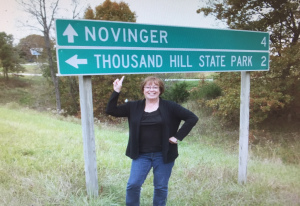 You may or may not know that my maiden name is Novinger (pronounced Nah-vin-gher). And I’m fairly sure that you don’t know there’s a small town in Missouri named Novinger that was founded by my forefathers.
You may or may not know that my maiden name is Novinger (pronounced Nah-vin-gher). And I’m fairly sure that you don’t know there’s a small town in Missouri named Novinger that was founded by my forefathers.
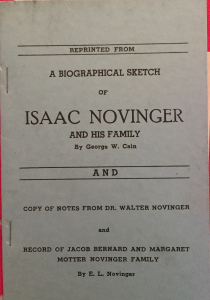 Issac Novinger was the first Novinger to land in Missouri after moving from Dauphin County, Pennsylvania. In a small pamphlet written about Issac, E.L. Novinger, wrote this: Issac saw that he would never be able to secure a home for himself and his family in the lands of his fathers, and so he looked toward the setting sun and discovered in North Missouri a land like the garden of the Lord.
Issac Novinger was the first Novinger to land in Missouri after moving from Dauphin County, Pennsylvania. In a small pamphlet written about Issac, E.L. Novinger, wrote this: Issac saw that he would never be able to secure a home for himself and his family in the lands of his fathers, and so he looked toward the setting sun and discovered in North Missouri a land like the garden of the Lord.
In April of 1847 Issac loaded a wagon and moved his wife and seven children to Missouri. It took him a month to get there. When the railroad was extended west in 1878 John C. Novinger wasn’t happy about giving up farm land and agreed to do so if the depot was named Novinger. In January of 1879 Novinger was named a United States post office and officially became a town.
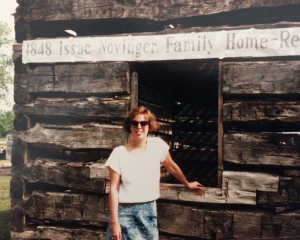 The picture above is of me in the late 80’s outside Issac’s cabin which was moved from his farm into the town of Novinger. It’s now been restored as a museum. The picture below is from 2012. I love that the sign says by appointment or chance.
The picture above is of me in the late 80’s outside Issac’s cabin which was moved from his farm into the town of Novinger. It’s now been restored as a museum. The picture below is from 2012. I love that the sign says by appointment or chance.
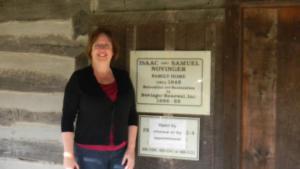 My father grew up on a farm outside of Novinger and we visited it often from our home in Davenport, Iowa. When I was young I was fairly certain we owned the small town and that I was probably some kind of royalty. (I’m still waiting for the tiara.)
My father grew up on a farm outside of Novinger and we visited it often from our home in Davenport, Iowa. When I was young I was fairly certain we owned the small town and that I was probably some kind of royalty. (I’m still waiting for the tiara.)
This is a photo of me standing in my grandfather’s field. I don’t have a farming bone in my body and can barely keep a houseplant alive.
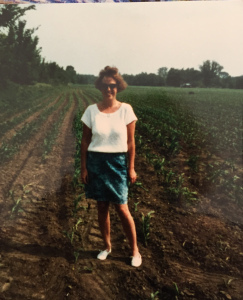 My grandparents were savers and here is some of the memorabilia from their home. This is a photo of the town baseball team. The area was a big coal mining town at the time.
My grandparents were savers and here is some of the memorabilia from their home. This is a photo of the town baseball team. The area was a big coal mining town at the time.
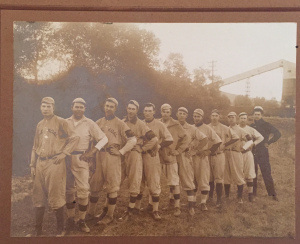 On the hundredth anniversary of the town of Novinger, they produced a two volume history of the town. Each book is almost an inch thick.
On the hundredth anniversary of the town of Novinger, they produced a two volume history of the town. Each book is almost an inch thick.
While these guys look like an early version of ZZ Top what I like best about the photo is the chair on the right!
 The back of this photo says store and hotel. Fancy!
The back of this photo says store and hotel. Fancy!
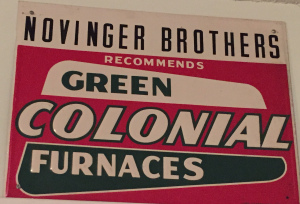 I love the tin sign above and the tablet below. Look at the small print on the tablet — it says Novinger, Mo.
I love the tin sign above and the tablet below. Look at the small print on the tablet — it says Novinger, Mo.
Readers: Do you have a town or area that your ancestors are from? What do you have that is special to you?
Filed under: Sherry's posts Tagged: ancestors, Calumet Baking Powder, Dauphin County PA, farms, Green Colonial Furnaces, Novinger Missouri, tin signs

September 19, 2015
One Wicked Quiz
 We confess we’re addicted to all those quizzes you see on Facebook so we are really excited to have our own! Which Wicked Cozy Protagonist Are You? Click the picture, (or click here), take the quiz, and tell us in the comments which protagonist you got.
We confess we’re addicted to all those quizzes you see on Facebook so we are really excited to have our own! Which Wicked Cozy Protagonist Are You? Click the picture, (or click here), take the quiz, and tell us in the comments which protagonist you got.
Watch for our upcoming quizzes: Which Wicked Cozy Town Should You Live In? Which Wicked Job Should You Have? Which Romantic Interest Should You Be With? And more!
Have fun!
Filed under: Uncategorized Tagged: protagonists, Quiz


